
Electronic measurement provider Keysight (NYSE: KEYS) reported Q3 CY2024 results beating Wall Street’s revenue expectations, but sales fell by 1.8% year on year to $1.29 billion. On top of that, next quarter’s revenue guidance ($1.63 billion at the midpoint) was surprisingly good and 32% above what analysts were expecting. Its non-GAAP profit of $1.65 per share was 5% above analysts’ consensus estimates.
Is now the time to buy Keysight? Find out by accessing our full research report, it’s free.
Keysight (KEYS) Q3 CY2024 Highlights:
- Revenue: $1.29 billion vs analyst estimates of $1.26 billion (1.8% year-on-year decline, 2.3% beat)
- Adjusted EPS: $1.65 vs analyst estimates of $1.57 (5% beat)
- Revenue Guidance for Q4 CY2024 is $1.63 billion at the midpoint, above analyst estimates of $1.24 billion
- Adjusted EPS guidance for Q4 CY2024 is $1.68 at the midpoint, above analyst estimates of $1.55
- Operating Margin: 17.9%, down from 24.2% in the same quarter last year
- Free Cash Flow Margin: 24.9%, similar to the same quarter last year
- Market Capitalization: $26.28 billion
Company Overview
Spun off from Hewlett-Packard in 2014, Keysight (NYSE: KEYS) offers electronic measurement products for use in various sectors.
Inspection Instruments
Measurement and inspection instrument companies may enjoy more steady demand because products such as water meters are non-discretionary and mandated for replacement at predictable intervals. In the last decade, digitization and data collection have driven innovation in the space, leading to incremental sales. But like the broader industrials sector, measurement and inspection instrument companies are at the whim of economic cycles. Interest rates, for example, can greatly impact civil, commercial, and residential construction projects that drive demand.
Sales Growth
A company’s long-term sales performance can indicate its overall quality. Any business can put up a good quarter or two, but many enduring ones grow for years. Unfortunately, Keysight’s 2.9% annualized revenue growth over the last five years was sluggish. This was below our standards and is a tough starting point for our analysis.
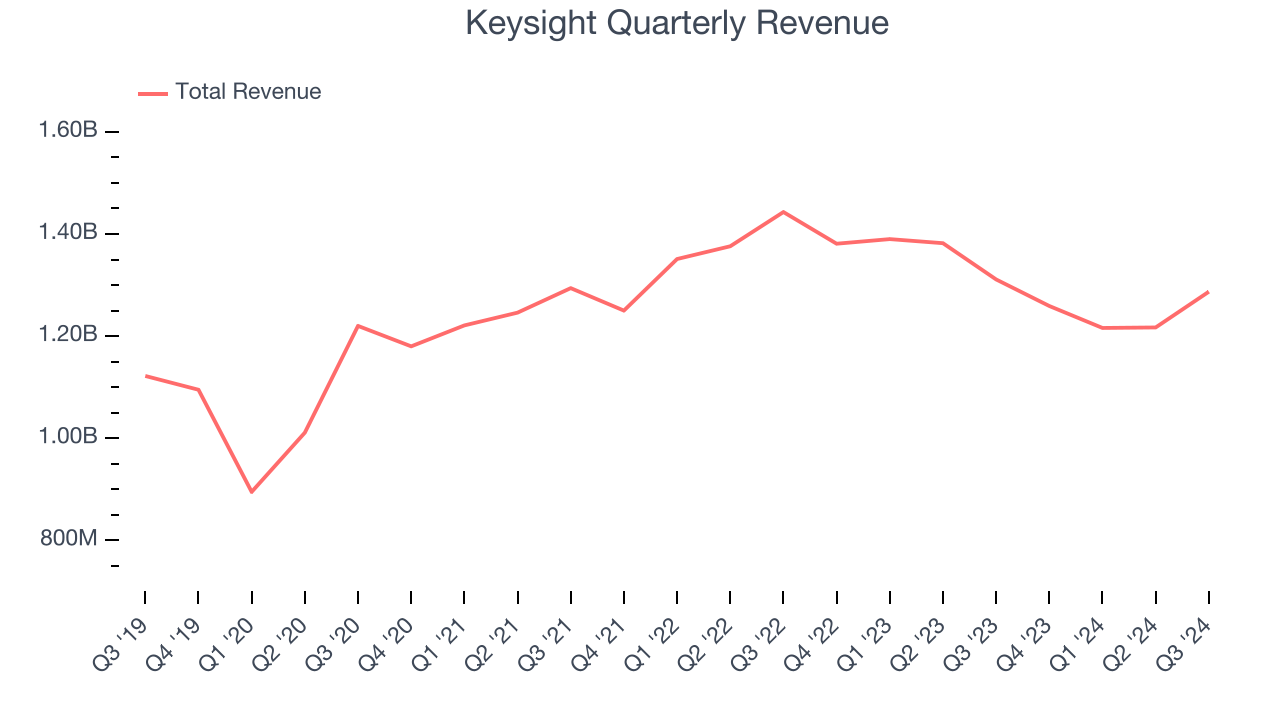
We at StockStory place the most emphasis on long-term growth, but within industrials, a half-decade historical view may miss cycles, industry trends, or a company capitalizing on catalysts such as a new contract win or a successful product line. Keysight’s history shows it grew in the past but relinquished its gains over the last two years, as its revenue fell by 4.2% annually. 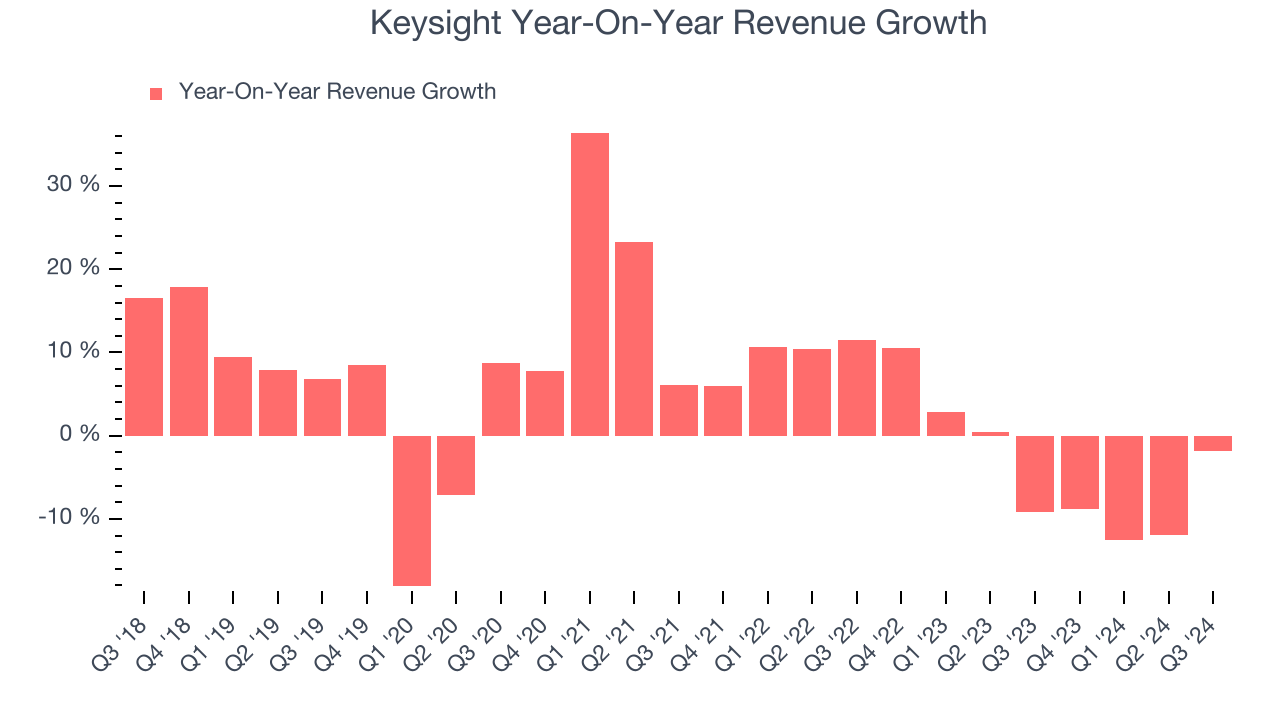
This quarter, Keysight’s revenue fell by 1.8% year on year to $1.29 billion but beat Wall Street’s estimates by 2.3%. Company management is currently guiding for a 29.7% year-on-year increase in sales next quarter.
Looking further ahead, sell-side analysts expect revenue to grow 5.9% over the next 12 months, an improvement versus the last two years. Although this projection indicates its newer products and services will catalyze better performance, it is still below average for the sector.
Here at StockStory, we certainly understand the potential of thematic investing. Diverse winners from Microsoft (MSFT) to Alphabet (GOOG), Coca-Cola (KO) to Monster Beverage (MNST) could all have been identified as promising growth stories with a megatrend driving the growth. So, in that spirit, we’ve identified a relatively under-the-radar profitable growth stock benefitting from the rise of AI, available to you FREE via this link.
Operating Margin
Operating margin is an important measure of profitability as it shows the portion of revenue left after accounting for all core expenses–everything from the cost of goods sold to advertising and wages. It’s also useful for comparing profitability across companies with different levels of debt and tax rates because it excludes interest and taxes.
Keysight has been a well-oiled machine over the last five years. It demonstrated elite profitability for an industrials business, boasting an average operating margin of 21.5%. This result isn’t surprising as its high gross margin gives it a favorable starting point.
Analyzing the trend in its profitability, Keysight’s annual operating margin decreased by 1.4 percentage points over the last five years. Even though its historical margin is high, shareholders will want to see Keysight become more profitable in the future.
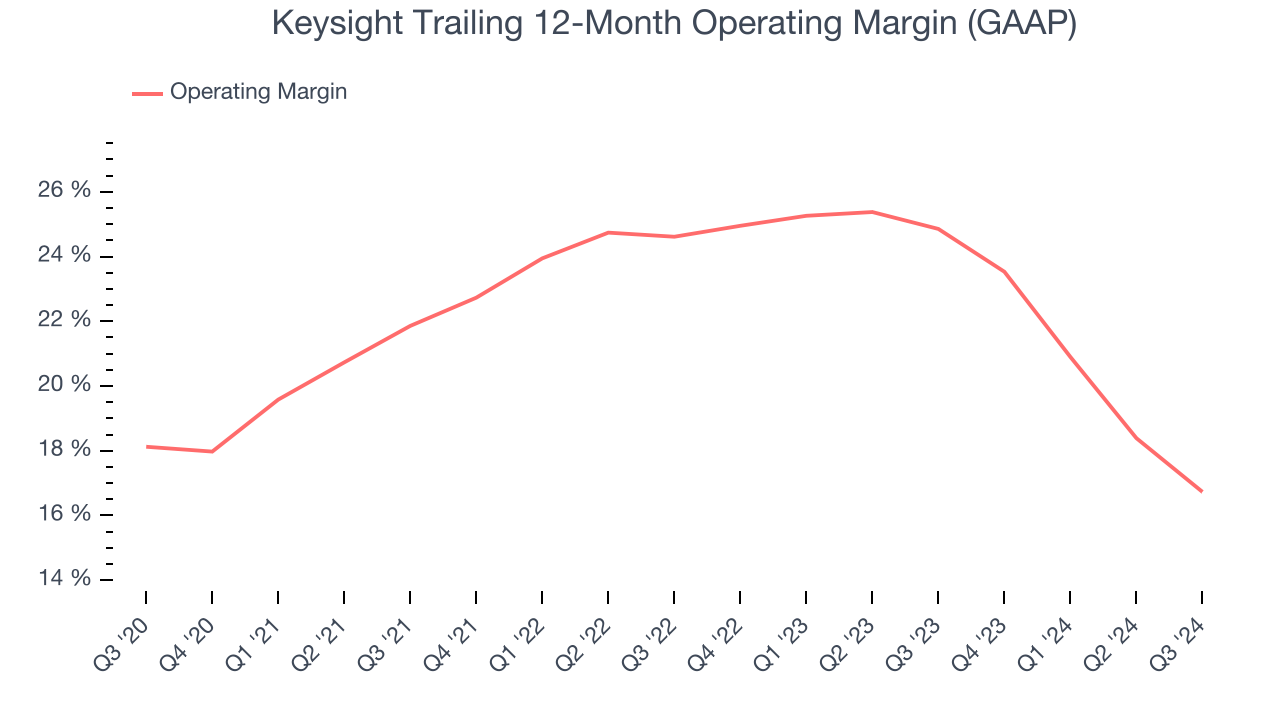
In Q3, Keysight generated an operating profit margin of 17.9%, down 6.3 percentage points year on year. Since Keysight’s operating margin decreased more than its gross margin, we can assume it was recently less efficient because expenses such as marketing, R&D, and administrative overhead increased.
Earnings Per Share
We track the long-term change in earnings per share (EPS) for the same reason as long-term revenue growth. Compared to revenue, however, EPS highlights whether a company’s growth is profitable.
Keysight’s EPS grew at an unimpressive 5.8% compounded annual growth rate over the last five years. This performance was better than its 2.9% annualized revenue growth but doesn’t tell us much about its business quality because its operating margin didn’t expand.
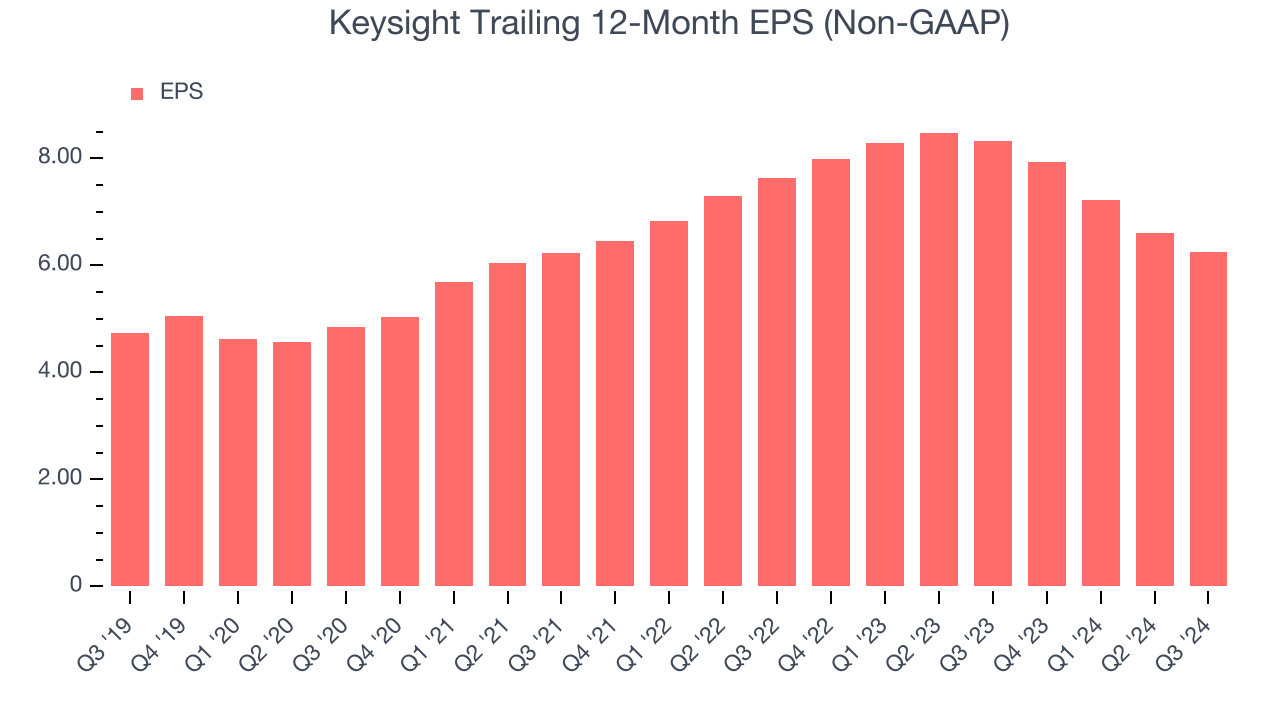
Diving into the nuances of Keysight’s earnings can give us a better understanding of its performance. A five-year view shows that Keysight has repurchased its stock, shrinking its share count by 9.4%. This tells us its EPS outperformed its revenue not because of increased operational efficiency but financial engineering, as buybacks boost per share earnings. 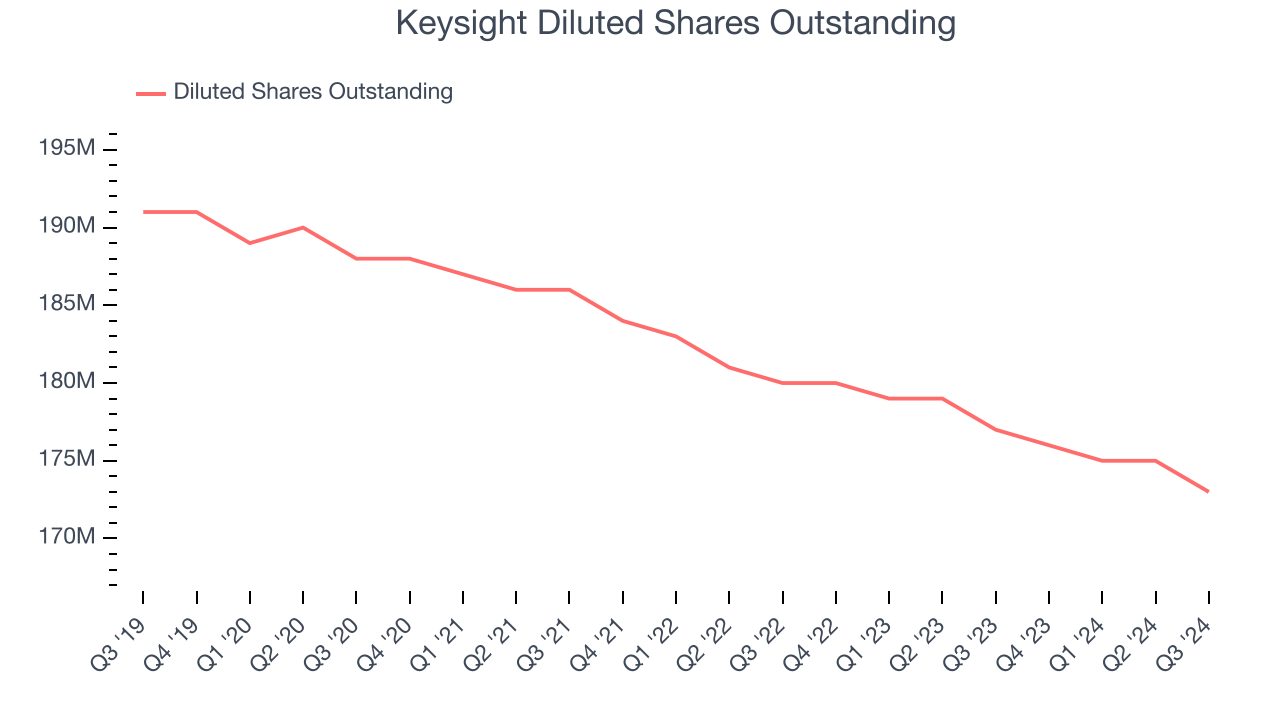
Like with revenue, we analyze EPS over a more recent period because it can provide insight into an emerging theme or development for the business.
For Keysight, its two-year annual EPS declines of 9.4% show it’s continued to underperform. These results were bad no matter how you slice the data.In Q3, Keysight reported EPS at $1.65, down from $1.99 in the same quarter last year. Despite falling year on year, this print beat analysts’ estimates by 5%. Over the next 12 months, Wall Street expects Keysight’s full-year EPS of $6.26 to grow by 12.2%.
Key Takeaways from Keysight’s Q3 Results
We were impressed by Keysight’s optimistic EPS guidance for next quarter, which blew past analysts’ expectations. We were also glad its revenue guidance for next quarter came in meaningfully higher than Wall Street’s estimates. Zooming out, we think this was a very good quarter with some key areas of upside. The stock traded up 10.2% to $167.78 immediately after reporting.
Keysight put up rock-solid earnings, but one quarter doesn’t necessarily make the stock a buy. Let’s see if this is a good investment. When making that decision, it’s important to consider its valuation, business qualities, as well as what has happened in the latest quarter. We cover that in our actionable full research report which you can read here, it’s free.





